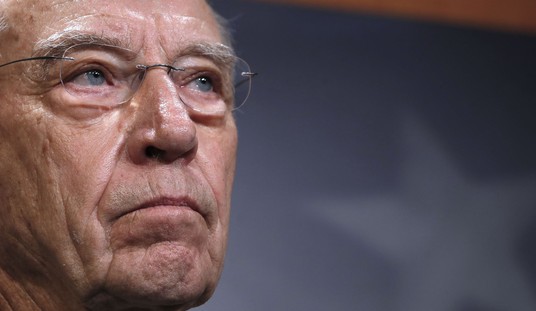The Democratic Party is grasping at straws to find a narrative — any narrative — that might deflect the blame for the Schumer Shutdown off of them and on to Republicans.
So far, those efforts have failed. CNBC, CNN, and ABC News all blame the Democrats for the prolonged Schumer Shutdown, and polls show Republicans have received a boost in their approval ratings.
Oof.
This means Democrats are desperate for a way to change the conversation. Minnesota Governor and failed Vice Presidential candidate Tim Walz has chimed in, and his claim is both wrong and mathematically illiterate.
Every $1 invested in SNAP generates $1.80 in economic activity.
— Governor Tim Walz (@GovTimWalz) October 28, 2025
It’s not about the money, Trump just wants Americans to go hungry.
That's not how math works.
If it did, what's the argument against putting everyone on SNAP?
So if we put 300 million Americans on $1,000 of SNAP benefits, we’d have $300 billion of economic activity? Wow. Why not put them on $1 million of SNAP benefits, and we’d have $300 TRILLION! We could pay off the national debt with lots of money left over!!
— Other Brother Darrell 🇮🇱 (@d_pitz) October 28, 2025
According to Cato, most Americans believe that cutting the federal workforce and federal spending would increase economic activity:
Many see a bloated federal workforce as part of the problem as well: 51 percent believe the federal government employs too many workers, and they estimate that 34 percent of federal jobs are unnecessary. Accordingly, 62 percent support cutting the number of federal employees to reduce spending.
Americans also believe these cuts would bring broader economic benefits. Nearly two-thirds (64 percent) say reducing federal government spending would help the economy, compared to 22 percent who believe it would harm it. Few (14 percent) think cutting government spending would have no impact on the economy.
...
Americans are more unified in their approach to reducing the $2 trillion federal budget deficit. Nearly two-thirds (64 percent) want to focus either exclusively (49 percent) or primarily (15 percent) on spending cuts rather than on raising taxes. Only 15 percent want to exclusively (5 percent) or primarily (10 percent) raise taxes, while less than a quarter (22 percent) want to both cut spending and raise taxes equally.
Recommended
If the Democratic Party's argument is that SNAP is essential because its recipients don't have money for food, where does the additional $0.80 of economic activity come from?
The Center on Budget and Policy Priorities (CBPP) calls SNAP one of the "fastest, most effective options for economic stimulus" by "free[ing] up other household income for other needed goods and services." Unfortunately, we've all seen numerous videos of SNAP recipients threatening violence if the funds dry up ... from their smartphones. We've also seen the videos of carts overloaded with food, paid for by SNAP.
And, as we all know, government-led economic stimulus rarely yields positive results and often leads to inflation which increases the price of everything, including groceries.
Wash, rinse, repeat.
But more than that, SNAP is rife with fraud, and this is where Walz's argument really falls apart. A recent 54-page report released by LexisNexis Risk Solutions is eye-opening (emphasis added):
According to the 2025 study, the average monthly rate of fraudulent SNAP applications and post-issuance cases has doubled since 2024. For every $1 in SNAP benefits lost to fraud, agencies now incur $4.14 in total costs, up from $3.93 a year ago.
"SNAP is a lifeline for millions of families, and these findings highlight how increasingly sophisticated criminals are targeting this critical benefit program," said Amanda D' Amico, Senior Director at LexisNexis Risk Solutions. "Digital channels and expanded eligibility systems improve access but also expand the attack surface. Agencies that leverage real-time data, identity verification, and digital authentication solutions to detect fraud and increase cross-program collaboration can turn the tide against fraud while ensuring timely benefits for those in need."
An illegal immigrant from Italy, residing in Oregon, was recently sentenced to two years in prison for a $2.4 million SNAP/EBT fraud scheme.
Giovanni Spirea, 29, was sentenced to 24 months in federal prison and three years of supervised release. He was also ordered to pay $61,874.32 in restitution.
Court documents say that from August 2023 to October 2024, Spirea and his co-conspirators used electronic skimming devices to steal Supplemental Nutrition Assistance Program (SNAP) benefits, encoded the stolen data on cloned Electronic Benefit Transfer (EBT) cards, and illegally purchased items with the stolen benefits.
“Protecting government funded programs, like the Supplemental Nutrition Assistance Program isn’t just about preserving funds – it’s about safeguarding trust in a vital lifeline that millions of families depend on to put food on the table,” said U.S. Attorney for the District of Oregon Scott E. Bradford. “Today’s sentencing should deter perpetrators from defrauding American families and the federal government for personal gain.”
SNAP is not an "investment" program.
When will this myth die.
— Kyle Pomerleau (@kpomerleau) October 29, 2025
You can defend SNAP as a transfer that improves the wellbeing of low income households, but not as pro-growth policy.
SNAP and the taxes required to fund it reduce economic output. https://t.co/oKUEbBDVLI
This myth dies when Democrats believe it'll stop giving them some political leverage. And given the state of education in Democrat-controlled cities, that's not happening any time soon.
Tim, A dollar spent doesn't magically become a dollar and 80 cents because its spent. You took that money from someone. What you are really doing is taking wealth from one person, and giving it to another. No wealth was created.
— Paul (@WomanDefiner) October 29, 2025
By your logic every tax dollar you take removes a… https://t.co/3q8BD8uQmf pic.twitter.com/wFbd1Alw7s
That clip nails it.
Policymakers keep repeating this talking point: “every $1 of SNAP creates $1.50–$1.80 in economic value.”
— Jack Salmon (@_JackSalmon_) October 29, 2025
That number comes from a 2019 USDA model, but it’s deeply misleading. Here’s why the 1.5x claim is bad economics 👇 https://t.co/rJH4dEao51
In a paper examining the issue, Salmon wrote, "Although short-term impacts may boost output, long-term effects often diminish or turn negative due to reduced private investment and consumption, emphasizing the role of anticipatory effects and private-sector responses."
"The 1.5x SNAP figure is not an “economic return”—it’s an inflated estimate policymakers should stop repeating," he posted on X.
Someone should tell that to Tim Walz.
Editor’s Note: The Schumer Shutdown is here. Rather than put the American people first, Chuck Schumer and the radical Democrats forced a government shutdown for healthcare for illegals. They own this.
Help us continue to report the truth about the Schumer Shutdown. Use promo code POTUS47 to get 74% off your VIP membership.
























Join the conversation as a VIP Member